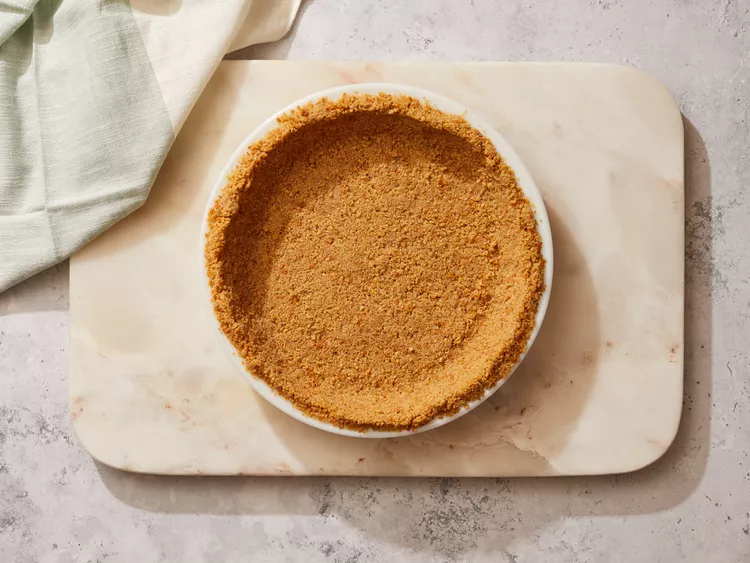How to Make a Homemade Graham Cracker Crust

Baking season is upon us! Skip the store bought graham cracker crust, and make your own this year. It takes just 15 minutes from start to finish. You'll be rewarded with a fresh graham cracker crust that's tender, buttery, and ready to be filled.
Tips for Making a Homemade Graham Cracker Pie Crust
Here are a few things to keep in mind when making a homemade graham cracker crust.
- Finely crush the cracker! Small, even crumbs are essential to achieving the perfect texture. Too many large pieces won't cook evenly.
- You can use either salted or unsalted butter for this recipe. We don't recommend substituting oil or shortening here.
- When adding the crumb mixture to the pie plate, press it evenly throughout the dish. The helps ensure it bakes properly and each bite is golden-brown and crisp.
Our Favorite Ways to Use a Graham Cracker Crust
Now that you've mastered this graham cracker pie crust recipe, put it to good use! Here are a few of our favorite pies with a cookie crumb crust. It's delicious with a chocolate filling or piled high with fluffy meringue.
Ingredients
-
Nonstickcooking spray
-
1/3 cup butter
-
1/4 cup sugar
-
1 1/4 cups finely crushed graham crackers (about 18)
Directions
-
Prep Mixture
Preheat oven to 375°F. Lightly coat a 9-inch pie plate with cooking spray; set aside. Melt butter; stir in sugar. Add crushed crackers; toss to mix well.
-
Press and Bake
Spread in the prepared pie plate; press evenly onto bottom and sides. Bake about 5 minutes or until edges are light brown. Cool completely on a wire rack. Fill as directed in recipes.
Nutrition Facts (per serving)
| 148 | Calories |
| 9g | Fat |
| 16g | Carbs |
| 1g | Protein |
| Nutrition Facts | |
|---|---|
| Servings Per Recipe 8 | |
| Calories 147.9 | |
| % Daily Value * | |
| Total Fat 9g | 12% |
| Saturated Fat 5g | 25% |
| Cholesterol 20.1mg | 7% |
| Sodium 120.5mg | 5% |
| Total Carbohydrate 16.4g | 6% |
| Dietary Fiber 0.4g | 2% |
| Total Sugars 9.5g | |
| Protein 1g | 2% |
| Vitamin D 0mcg | 0% |
| Vitamin C 0mg | 0% |
| Calcium 12.4mg | 1% |
| Iron 0.5mg | 3% |
| Potassium 24.7mg | 1% |
| Fatty acids, total trans 0.3g | |
| Vitamin D 0IU | |
| Alanine 0g | |
| Arginine 0g | |
| Ash 0.4g | |
| Aspartic acid 0g | |
| Caffeine 0mg | |
| Carotene, alpha 0mcg | |
| Choline, total 2.5mg | |
| Copper, Cu 0mg | |
| Cystine 0g | |
| Energy 618.5kJ | |
| Fluoride, F 0.3mcg | |
| Folate, total 12.2mcg | |
| Glutamic acid 0g | |
| Glycine 0g | |
| Histidine 0g | |
| Isoleucine 0g | |
| Leucine 0g | |
| Lysine 0g | |
| Methionine 0g | |
| Magnesium, Mg 5.4mg | |
| Manganese, Mn 0.1mg | |
| Niacin 0.6mg | |
| Phosphorus, P 26.5mg | |
| Pantothenic acid 0.1mg | |
| Phenylalanine 0g | |
| Proline 0g | |
| Retinol 62.8mcg | |
| Selenium, Se 1mcg | |
| Serine 0g | |
| Starch 6.1g | |
| Theobromine 0mg | |
| Threonine 0g | |
| Vitamin E (alpha-tocopherol) 0.4mg | |
| Tryptophan 0g | |
| Tyrosine 0g | |
| Valine 0g | |
| Vitamin A, IU 234.3IU | |
| Vitamin A, RAE 64mcg | |
| Vitamin B-12 0mcg | |
| Vitamin B-6 0mg | |
| Vitamin K (phylloquinone) 2.5mcg | |
| Water 1.9g | |
| Zinc, Zn 0.1mg | |
*The % Daily Value (DV) tells you how much a nutrient in a food serving contributes to a daily diet. 2,000 calories a day is used for general nutrition advice.